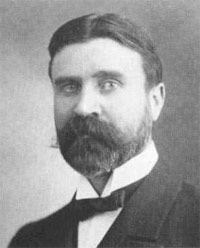It seems superfluous, but may be permissible, to point out that medicine has its Noah and it “Ark of Safety” represented by Hahnemann and Homoeopathy. Hahnemann saw the futility and danger of the medical methods of his day, listened to the warning voice and proceeded to build his ark. He abandoned the idea of destroying disease by violent measures. He perceived and taught (in his vital-dynamic theory) that the solution of the problem of disease lay in the recognition of, and co-operation with, Life as the sole formative and governing principle of the organism. He recognized that life is spiritual, not material.
He taught the necessity of studying the individual as a living, thinking and feeling being; of watching his natural, vital or physiological actions and reactions to external agencies of all kinds, and of noting and using his subjective, as well as his objective, responses to medication. He took the normal, healthy organism as his standard of comparison and field of experimentation with medicines. He collected, classified and correlated his observations carefully and logically and developed a materia medica and system of pharmacotherapeutics on scientific principles.
He did his work cautiously, gently, humanely, using the smallest quantities of drugs two which the organism would react. He did not violently invade the precincts of life, making breaches in its outer walls and breaking down its defences. He sought and gained entrance to its citadel through its natural portals. He came as the ambassador of peace and harmony and was admitted without armed resistance. LAst, and not least, he discovered the principle of Dynamization and the power of the infinitesimal dose, represented today in the chemico-electrical theories of Ionization and Infinite Dilution. This made forever unnecessary the use of large dose of crude and dangerous drugs for curative purposes.
But like Noah, his primeval prototype, Hahnemann met with doubt, derision and disrespect. His orthodox medical brethren denounced him for his temerity, ridiculed his ideas, ostracized him, hampered, opposed and persecuted him in every way, seeking to destroy his influence and crush him. A few, however, entered the ark he had build and rode the waters of the deluge in safety.
The principles which Hahnemann labored and suffered to establish have been perpetuated. They have stood the test of time and experience. Slowly but steadily his ideas have permeated medicine, to be acknowledged openly or tacitly by some, appropriated without credit to their originator by others, and perverted by still others.
In his work and that of his loyal and competent followers in the field of medicinal therapeutics, coupled with the work of humane, conservative surgeons, sanitary engineers and representatives of the various non-medicinal, mechanical, mental or psychical therapeutics systems, and with hygiene, dietetics, physical culture and human morphology, lies the hope of the world for health and healing so far as it depends upon the professions. These, individually and collectively, represent “the Opposition” to the Medical Oligarchy which has so long arrogated to itself all power, privilege, wisdom and authority in medicine, and has forced upon the people methods and measures of medication which violate every principle of true healing, and lead to the physical degeneration of the race.
The Soul of Man is revolting. He will not forever submit to Violent Medicine.

